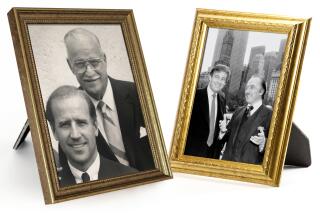THE 1992 DEBATES : Clinton Cites Bushâs Father as Joe McCarthy Foe
WASHINGTON â Democrat Bill Clinton invoked a surprising political role model in his debate with President Bush and Ross Perot on Sunday night: Prescott Bush, the Presidentâs late father.
Clinton was responding to Bushâs recent charges that the Democrat was âwrongâ to demonstrate against the Vietnam War when he was a university student in England, and that he needed to explain his 1969 vacation trip to Moscow.
âYou have questioned my patriotism,â Clinton told the President.
âWhen Joe McCarthy went around this country attacking peopleâs patriotism, he was wrong. He was wrong. And a senator from Connecticut stood up to him named Prescott Bush,â Clinton said. âYour father was right to stand up to Joe McCarthy; you were wrong to attack my patriotism. I was opposed to the war but I loved my country.â
Bush did not respond to Clintonâs mention of his father. But he backed away from the Moscow charge--as he first did late last week--and said: âI didnât question the manâs patriotism. I questioned his judgment and his character.â
And, just before Clinton made the comparison, Bush had said he resented Democratsâ charges that his attacks resembled McCarthyism.
âI was accused of being like Joe McCarthy because . . . I think itâs wrong to demonstrate against your own country or organize demonstrations against your own country in foreign soil,â Bush said.
By comparing Bush unfavorably to his father, Clinton was, in effect, questioning Bushâs character--just as Bush has questioned his.
The older Bush, a Republican senator from Connecticut from 1952 to 1964, took a leading role in urging his party to curb the excesses of Sen. Joseph R. McCarthy (R-Wis.).
In the early 1950s, McCarthy accused hundreds of officials at the State Department and other government agencies of Communist sympathies--often without real evidence. He used his position as chairman of the Senate Committee on Government Operations and its permanent subcommittee on investigations to launch probes designed to document his charges.
âPrescott Bush was a hero,â said Stephen Ambrose of the University of New Orleans, a historian who has written about the period. âWhat Clinton said was right. There were not many Republicans speaking out against McCarthy at the time.â
Asked whether Clintonâs charge of McCarthyism against George Bush was warranted, Ambrose said: âWhat Bush did does smack of McCarthyism . . . but whether itâs equally condemnable, thatâs a judgment youâll have to make for yourself.â
McCarthyâs tactic of leveling poisonous charges of disloyalty without evidence destroyed dozens of careers and became known as âMcCarthyism.â
At first, McCarthy attacked mostly Democrats, accusing Presidents Franklin D. Roosevelt and Harry S. Truman of â20 years of treason.â Republican President Dwight D. Eisenhower did little to curb the anti-communist hysteria, while GOP leaders in Congress supported the Wisconsin senatorâs crusade.
But by 1954 McCarthy began attacking Eisenhowerâs Administration as well. He finally overstepped by clashing with Eisenhowerâs secretary of the Army in televised hearings on the promotion of an Army dentist who allegedly had Communist leanings.
Prescott Bush, a soft-spoken and gentlemanly representative of the old GOP Establishment, was one of a minority of Republicans who began arguing that McCarthy had to be stopped.
In December, 1954, as the Senate debated a motion to censure McCarthy, Prescott Bush was one of only three Republicans to denounce McCarthy on the Senate floor.
He condemned the Wisconsin senator for causing âdivisions among the American people.â
The vote to censure was 67-22. Republican senators were equally divided in the vote, 22-22.
By invoking Prescott Bush, who died in 1972, Clinton pointed implicitly to a dichotomy that some biographers have often cited in George Bushâs background--between the moderate, gentlemanly Eastern Establishment Republicanism of his father and the more bare-knuckled, Western conservatism that the younger Bush gradually adopted after moving to Texas in 1948.
More to Read
Get the L.A. Times Politics newsletter
Deeply reported insights into legislation, politics and policy from Sacramento, Washington and beyond. In your inbox three times per week.
You may occasionally receive promotional content from the Los Angeles Times.











